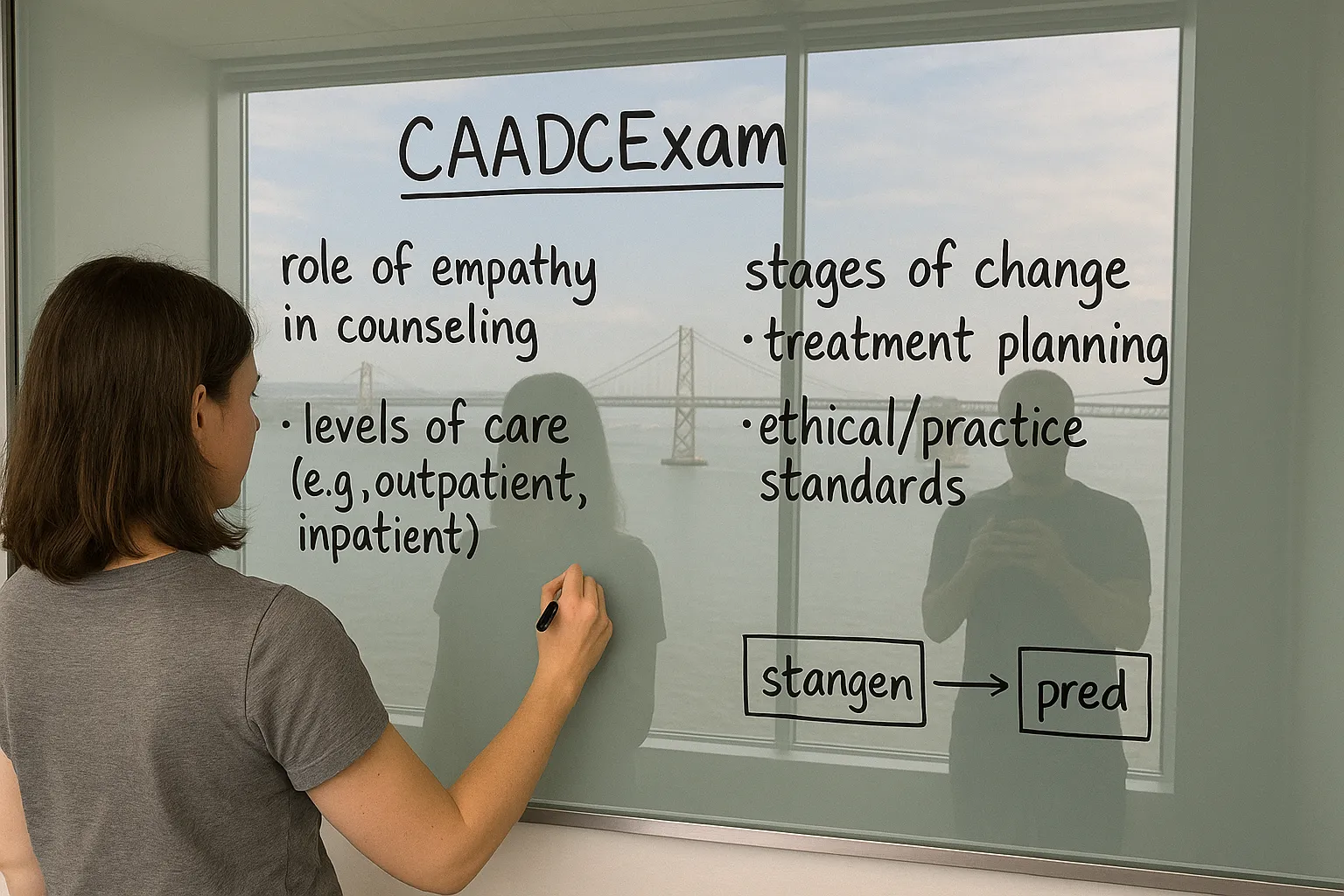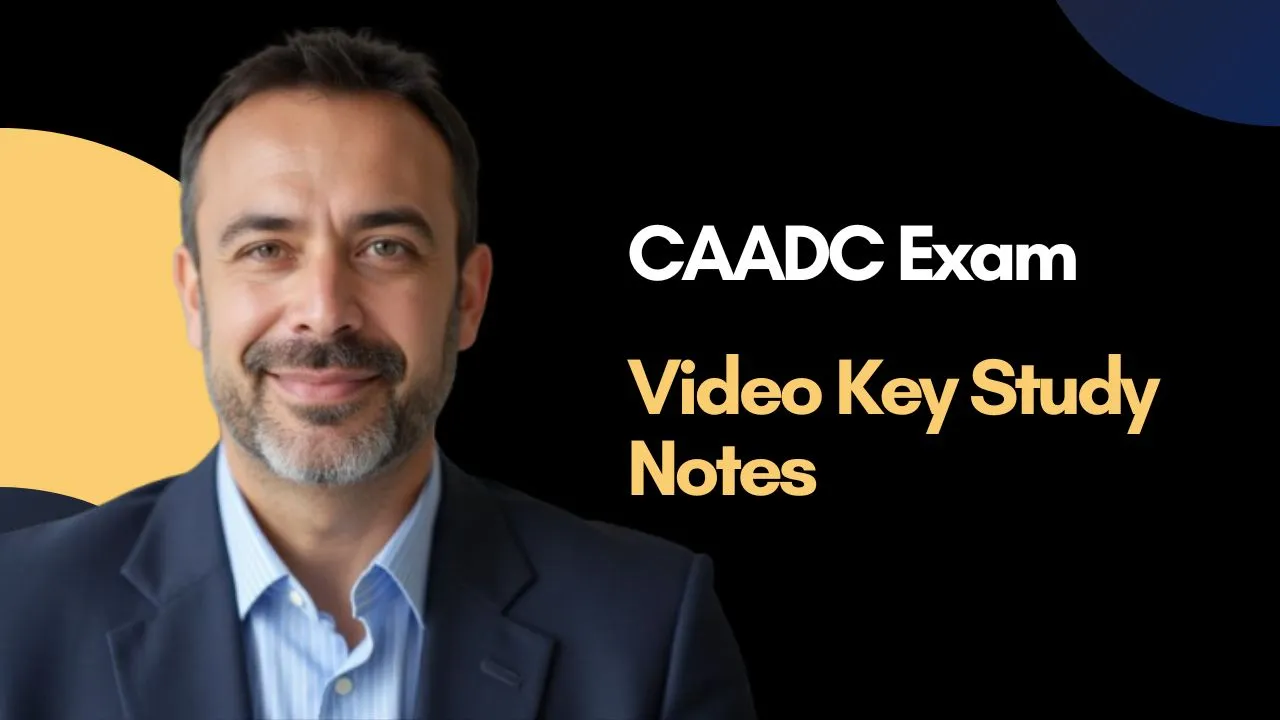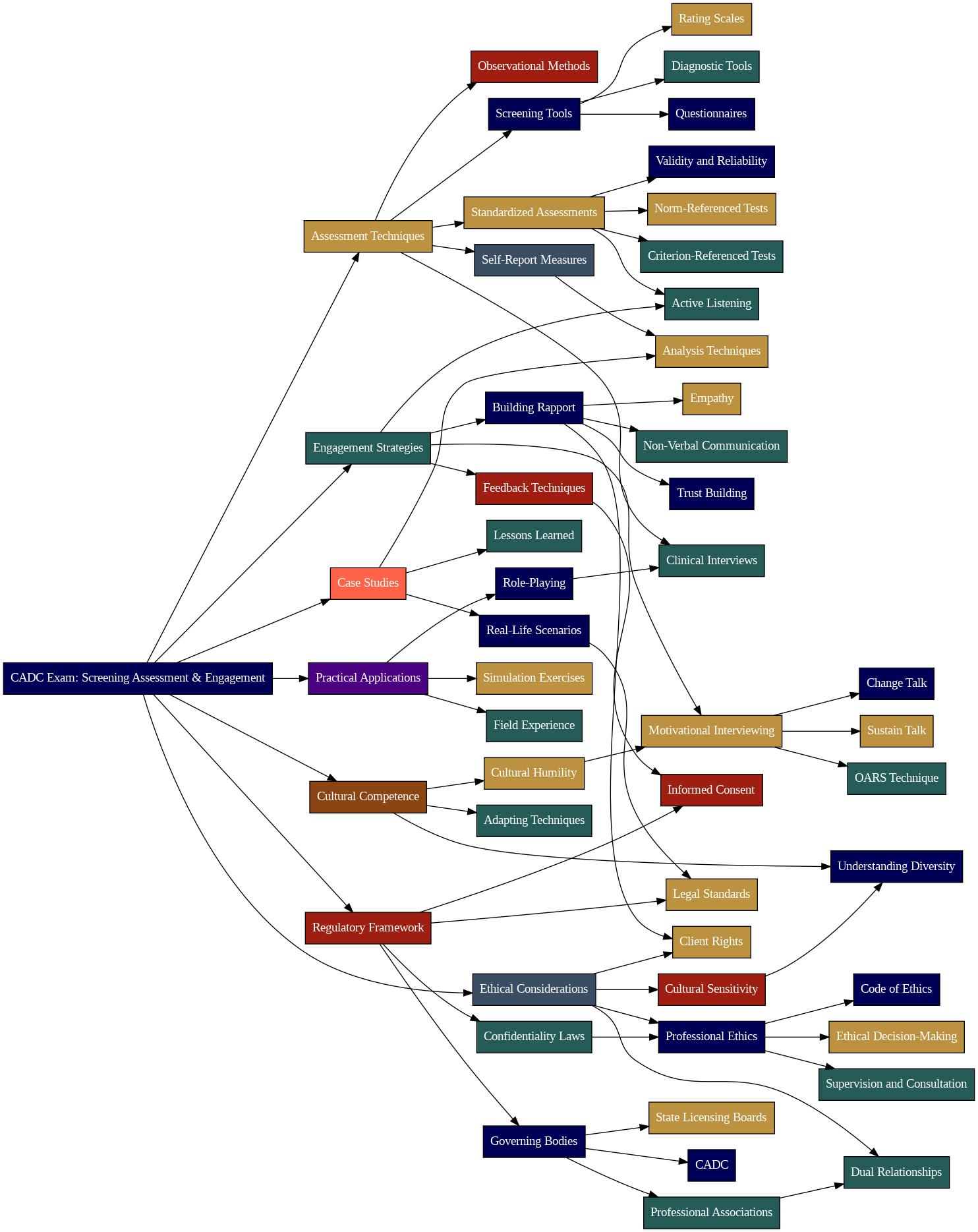Quiz-summary
0 of 29 questions completed
Questions:
- 1
- 2
- 3
- 4
- 5
- 6
- 7
- 8
- 9
- 10
- 11
- 12
- 13
- 14
- 15
- 16
- 17
- 18
- 19
- 20
- 21
- 22
- 23
- 24
- 25
- 26
- 27
- 28
- 29
Information
Premium Practice Questions
You have already completed the quiz before. Hence you can not start it again.
Quiz is loading...
You must sign in or sign up to start the quiz.
You have to finish following quiz, to start this quiz:
Results
0 of 29 questions answered correctly
Your time:
Time has elapsed
Categories
- Not categorized 0%
- 1
- 2
- 3
- 4
- 5
- 6
- 7
- 8
- 9
- 10
- 11
- 12
- 13
- 14
- 15
- 16
- 17
- 18
- 19
- 20
- 21
- 22
- 23
- 24
- 25
- 26
- 27
- 28
- 29
- Answered
- Review
-
Question 1 of 29
1. Question
A new client, Javier, presents to an LCAC in Indiana for substance use counseling. Javier states he wants to stop using opioids “eventually,” but also expresses enjoyment of the “escape” it provides. He is hesitant to commit to immediate abstinence. Which of the following approaches best integrates Motivational Interviewing (MI) principles and ethical considerations for an Indiana LCAC?
Correct
The correct approach involves understanding the core principles of Motivational Interviewing (MI) and how they align with ethical considerations in addiction counseling, particularly in the context of Indiana regulations and the LCAC scope of practice. MI emphasizes client autonomy, collaboration, evocation, and compassion. Ethically, counselors must respect client self-determination, avoid coercion, and work within their scope of competence. Indiana’s LCAC guidelines reinforce these principles, emphasizing the importance of informed consent and client-centered care. Option a reflects the core of MI, where the counselor guides the client towards recognizing their own ambivalence and motivation for change, aligning with the client’s values and goals, and adhering to ethical principles of autonomy. This approach empowers the client to make informed decisions about their treatment, a key aspect of ethical practice in Indiana. Option b, while seemingly collaborative, could lead to premature action without fully exploring the client’s ambivalence. Option c is directive and could be perceived as coercive, undermining the client’s autonomy. Option d focuses solely on consequences, neglecting the client’s internal motivation and potentially creating resistance. The best course of action is to use MI to explore the client’s ambivalence, enhance their motivation, and support their self-directed change process, all while adhering to ethical and legal standards in Indiana.
Incorrect
The correct approach involves understanding the core principles of Motivational Interviewing (MI) and how they align with ethical considerations in addiction counseling, particularly in the context of Indiana regulations and the LCAC scope of practice. MI emphasizes client autonomy, collaboration, evocation, and compassion. Ethically, counselors must respect client self-determination, avoid coercion, and work within their scope of competence. Indiana’s LCAC guidelines reinforce these principles, emphasizing the importance of informed consent and client-centered care. Option a reflects the core of MI, where the counselor guides the client towards recognizing their own ambivalence and motivation for change, aligning with the client’s values and goals, and adhering to ethical principles of autonomy. This approach empowers the client to make informed decisions about their treatment, a key aspect of ethical practice in Indiana. Option b, while seemingly collaborative, could lead to premature action without fully exploring the client’s ambivalence. Option c is directive and could be perceived as coercive, undermining the client’s autonomy. Option d focuses solely on consequences, neglecting the client’s internal motivation and potentially creating resistance. The best course of action is to use MI to explore the client’s ambivalence, enhance their motivation, and support their self-directed change process, all while adhering to ethical and legal standards in Indiana.
-
Question 2 of 29
2. Question
Aisha, an LCAC in Indiana, is treating a client, David, for opioid use disorder. David’s employer, unaware of David’s SUD treatment, contacts Aisha with a general release of information signed by David, requesting confirmation of David’s attendance at counseling sessions to justify his recent absences. Which of the following actions should Aisha take to MOST ethically and legally comply with this request, considering Indiana-specific regulations and 42 CFR Part 2?
Correct
Indiana’s regulations regarding client confidentiality, particularly in the context of substance use disorder treatment, are primarily governed by a combination of state laws, federal regulations (42 CFR Part 2), and ethical guidelines for Licensed Clinical Addiction Counselors (LCACs). 42 CFR Part 2 is particularly stringent, requiring specific written consent for disclosure of any information identifying a patient as having or having had a substance use disorder, even within a healthcare organization, unless certain exceptions apply (e.g., medical emergencies, court orders). Indiana law complements these federal protections. The Indiana Administrative Code (IAC) Title 898, which pertains to the Behavioral Health and Human Services Licensing Board, provides further guidance on ethical conduct and client rights, including confidentiality. The HIPAA Privacy Rule also applies, but 42 CFR Part 2 often provides stricter protections for SUD treatment records. In a scenario involving a client’s employer requesting information, the LCAC must prioritize the client’s confidentiality rights under both 42 CFR Part 2 and relevant Indiana statutes. Simply having a general release of information is insufficient; a specific, informed consent that adheres to the requirements of 42 CFR Part 2 is required. Disclosing information without such consent would be a violation of both federal and state law, potentially leading to legal and ethical repercussions for the counselor. The counselor must also consider the potential impact of disclosure on the client’s employment and overall well-being, advocating for the client’s best interests while adhering to legal and ethical obligations.
Incorrect
Indiana’s regulations regarding client confidentiality, particularly in the context of substance use disorder treatment, are primarily governed by a combination of state laws, federal regulations (42 CFR Part 2), and ethical guidelines for Licensed Clinical Addiction Counselors (LCACs). 42 CFR Part 2 is particularly stringent, requiring specific written consent for disclosure of any information identifying a patient as having or having had a substance use disorder, even within a healthcare organization, unless certain exceptions apply (e.g., medical emergencies, court orders). Indiana law complements these federal protections. The Indiana Administrative Code (IAC) Title 898, which pertains to the Behavioral Health and Human Services Licensing Board, provides further guidance on ethical conduct and client rights, including confidentiality. The HIPAA Privacy Rule also applies, but 42 CFR Part 2 often provides stricter protections for SUD treatment records. In a scenario involving a client’s employer requesting information, the LCAC must prioritize the client’s confidentiality rights under both 42 CFR Part 2 and relevant Indiana statutes. Simply having a general release of information is insufficient; a specific, informed consent that adheres to the requirements of 42 CFR Part 2 is required. Disclosing information without such consent would be a violation of both federal and state law, potentially leading to legal and ethical repercussions for the counselor. The counselor must also consider the potential impact of disclosure on the client’s employment and overall well-being, advocating for the client’s best interests while adhering to legal and ethical obligations.
-
Question 3 of 29
3. Question
Jamal, an Indiana resident, presents to an LCAC reporting daily heroin use and expressing a desire to stop but fears withdrawal. He has no stable housing, a history of depression, and a recent overdose requiring naloxone administration. He is eligible for Medicaid. Considering Indiana-specific resources and guidelines, which level of care, according to ASAM criteria, would be MOST appropriate as an initial recommendation for Jamal, balancing his needs and available resources?
Correct
In Indiana, an LCAC encountering a client with suspected opioid use disorder must navigate several considerations when determining the most appropriate level of care. The American Society of Addiction Medicine (ASAM) criteria provide a comprehensive framework for assessment and placement. It’s crucial to consider the client’s current opioid use patterns, withdrawal symptoms, and any co-occurring medical or psychiatric conditions. Indiana’s Medicaid program (if applicable to the client) has specific guidelines regarding coverage for different levels of care, and these should be consulted to ensure the client can access the necessary treatment. Furthermore, Indiana’s INSPECT program (Indiana Scheduled Prescription Electronic Collection and Tracking Program) can be utilized to review the client’s prescription history, offering valuable insights into potential opioid misuse or diversion. The availability of Medication-Assisted Treatment (MAT) within each level of care is also a key factor. Some intensive outpatient programs (IOPs) and standard outpatient programs may not offer MAT, limiting their effectiveness for clients with severe opioid use disorder. Finally, the client’s motivation for change and their ability to adhere to treatment recommendations are critical determinants of success. A client who is ambivalent about treatment may benefit more from a less intensive setting initially, coupled with motivational interviewing techniques. Conversely, a client at high risk of relapse or overdose may require the structure and support of a residential treatment center or intensive outpatient program. The LCAC must document all these considerations in the client’s record to justify the chosen level of care and ensure compliance with ethical and legal standards.
Incorrect
In Indiana, an LCAC encountering a client with suspected opioid use disorder must navigate several considerations when determining the most appropriate level of care. The American Society of Addiction Medicine (ASAM) criteria provide a comprehensive framework for assessment and placement. It’s crucial to consider the client’s current opioid use patterns, withdrawal symptoms, and any co-occurring medical or psychiatric conditions. Indiana’s Medicaid program (if applicable to the client) has specific guidelines regarding coverage for different levels of care, and these should be consulted to ensure the client can access the necessary treatment. Furthermore, Indiana’s INSPECT program (Indiana Scheduled Prescription Electronic Collection and Tracking Program) can be utilized to review the client’s prescription history, offering valuable insights into potential opioid misuse or diversion. The availability of Medication-Assisted Treatment (MAT) within each level of care is also a key factor. Some intensive outpatient programs (IOPs) and standard outpatient programs may not offer MAT, limiting their effectiveness for clients with severe opioid use disorder. Finally, the client’s motivation for change and their ability to adhere to treatment recommendations are critical determinants of success. A client who is ambivalent about treatment may benefit more from a less intensive setting initially, coupled with motivational interviewing techniques. Conversely, a client at high risk of relapse or overdose may require the structure and support of a residential treatment center or intensive outpatient program. The LCAC must document all these considerations in the client’s record to justify the chosen level of care and ensure compliance with ethical and legal standards.
-
Question 4 of 29
4. Question
An LCAC in Indiana, while counseling an adult client, discovers that the client’s child is being left unsupervised for extended periods, resulting in the child missing school and lacking basic hygiene. The client minimizes the situation, stating they are “just going through a rough patch.” What is the LCAC’s ethical and legal responsibility in this situation?
Correct
In Indiana, LCACs are mandated reporters, meaning they are legally obligated to report suspected child abuse or neglect to the appropriate authorities, such as the Indiana Department of Child Services (DCS). This duty supersedes confidentiality in situations where a child’s safety is at risk. The reporting requirement applies even if the information is obtained during a confidential counseling session. The LCAC must have a reasonable suspicion of abuse or neglect, which is a lower standard than proof beyond a reasonable doubt. The report should include all relevant information, such as the child’s name, age, and address, as well as a description of the suspected abuse or neglect. Failure to report suspected child abuse or neglect can result in legal penalties for the LCAC. It is important for LCACs to be familiar with Indiana’s child abuse reporting laws and procedures and to consult with supervisors or legal counsel if they have questions about their reporting obligations. The priority is always the safety and well-being of the child.
Incorrect
In Indiana, LCACs are mandated reporters, meaning they are legally obligated to report suspected child abuse or neglect to the appropriate authorities, such as the Indiana Department of Child Services (DCS). This duty supersedes confidentiality in situations where a child’s safety is at risk. The reporting requirement applies even if the information is obtained during a confidential counseling session. The LCAC must have a reasonable suspicion of abuse or neglect, which is a lower standard than proof beyond a reasonable doubt. The report should include all relevant information, such as the child’s name, age, and address, as well as a description of the suspected abuse or neglect. Failure to report suspected child abuse or neglect can result in legal penalties for the LCAC. It is important for LCACs to be familiar with Indiana’s child abuse reporting laws and procedures and to consult with supervisors or legal counsel if they have questions about their reporting obligations. The priority is always the safety and well-being of the child.
-
Question 5 of 29
5. Question
A Licensed Clinical Addiction Counselor (LCAC) in Indiana, Jamila, is terminating services with a client, Ben, due to his consistent non-compliance with treatment recommendations. According to Indiana Administrative Code and ethical guidelines for LCACs, which of the following actions represents the MOST ethically responsible course of action?
Correct
According to Indiana Administrative Code Title 896, Article 3, Rule 6, Section 4, a Licensed Clinical Addiction Counselor (LCAC) must adhere to specific ethical guidelines when terminating services. These guidelines prioritize client welfare and continuity of care. Abandonment is explicitly prohibited, requiring the counselor to provide adequate notice and facilitate appropriate referrals. The ethical obligation to avoid abandonment means that abruptly ending services without proper planning is unacceptable. Providing referrals is a key component of ethical termination, ensuring the client has access to continued support. Simply informing the client of termination without assistance in finding alternative care violates ethical standards. While a counselor can terminate services due to non-payment or other valid reasons, they must still do so in a way that minimizes harm to the client. Offering a single referral might not be sufficient if the client has complex needs or if the referral is not appropriate for their specific situation. The counselor should actively assist the client in connecting with suitable resources. Documenting the termination process, including the reasons for termination, the referrals provided, and any follow-up actions, is crucial for ethical and legal protection. Ignoring these steps exposes the counselor to potential ethical complaints and legal liabilities. Therefore, the most ethically sound approach involves providing multiple referrals, documenting the process, and ensuring a smooth transition to other services.
Incorrect
According to Indiana Administrative Code Title 896, Article 3, Rule 6, Section 4, a Licensed Clinical Addiction Counselor (LCAC) must adhere to specific ethical guidelines when terminating services. These guidelines prioritize client welfare and continuity of care. Abandonment is explicitly prohibited, requiring the counselor to provide adequate notice and facilitate appropriate referrals. The ethical obligation to avoid abandonment means that abruptly ending services without proper planning is unacceptable. Providing referrals is a key component of ethical termination, ensuring the client has access to continued support. Simply informing the client of termination without assistance in finding alternative care violates ethical standards. While a counselor can terminate services due to non-payment or other valid reasons, they must still do so in a way that minimizes harm to the client. Offering a single referral might not be sufficient if the client has complex needs or if the referral is not appropriate for their specific situation. The counselor should actively assist the client in connecting with suitable resources. Documenting the termination process, including the reasons for termination, the referrals provided, and any follow-up actions, is crucial for ethical and legal protection. Ignoring these steps exposes the counselor to potential ethical complaints and legal liabilities. Therefore, the most ethically sound approach involves providing multiple referrals, documenting the process, and ensuring a smooth transition to other services.
-
Question 6 of 29
6. Question
A Licensed Clinical Addiction Counselor (LCAC) in Indiana receives a request from a local hospital for client Aaliyah’s substance use treatment records. The hospital states Aaliyah was admitted to the emergency room due to a medical emergency, and the records are needed to inform her medical treatment. Aaliyah is currently incapacitated and unable to provide consent. Under Indiana regulations and federal law, what is the MOST appropriate initial course of action for the LCAC?
Correct
Indiana’s regulations concerning client confidentiality, particularly within the context of substance use disorder treatment, are stringent and aligned with both federal HIPAA regulations and 42 CFR Part 2. This federal law provides extra protection for patient records related to substance use disorder treatment, mandating specific written consent for disclosure, even to medical personnel or family members, unless specific exceptions apply. These exceptions are narrowly defined and include scenarios such as medical emergencies, court orders, or qualified service organization agreements. Furthermore, Indiana law may impose additional requirements or interpretations, requiring counselors to be acutely aware of both federal and state guidelines. In the scenario described, a medical emergency does not automatically override confidentiality. While HIPAA allows for disclosure to treat a patient in an emergency, 42 CFR Part 2 requires specific consent or a court order, even in emergency situations, unless the counselor believes the patient’s life is in imminent danger and disclosure is necessary to prevent that danger. Simply stating a medical emergency exists is insufficient justification for breaching confidentiality under these regulations. The counselor must carefully weigh the risks and benefits of disclosure, considering the potential harm to the client’s treatment and recovery if confidentiality is breached without proper authorization. The best course of action is to attempt to obtain consent from the client, if possible, or to seek legal guidance if uncertainty persists.
Incorrect
Indiana’s regulations concerning client confidentiality, particularly within the context of substance use disorder treatment, are stringent and aligned with both federal HIPAA regulations and 42 CFR Part 2. This federal law provides extra protection for patient records related to substance use disorder treatment, mandating specific written consent for disclosure, even to medical personnel or family members, unless specific exceptions apply. These exceptions are narrowly defined and include scenarios such as medical emergencies, court orders, or qualified service organization agreements. Furthermore, Indiana law may impose additional requirements or interpretations, requiring counselors to be acutely aware of both federal and state guidelines. In the scenario described, a medical emergency does not automatically override confidentiality. While HIPAA allows for disclosure to treat a patient in an emergency, 42 CFR Part 2 requires specific consent or a court order, even in emergency situations, unless the counselor believes the patient’s life is in imminent danger and disclosure is necessary to prevent that danger. Simply stating a medical emergency exists is insufficient justification for breaching confidentiality under these regulations. The counselor must carefully weigh the risks and benefits of disclosure, considering the potential harm to the client’s treatment and recovery if confidentiality is breached without proper authorization. The best course of action is to attempt to obtain consent from the client, if possible, or to seek legal guidance if uncertainty persists.
-
Question 7 of 29
7. Question
A client, resident of Indiana, diagnosed with opioid use disorder and PTSD related to documented childhood abuse, is arrested for possession of heroin. The client’s attorney argues the PTSD directly caused the drug use, thus mitigating culpability. As the client’s LCAC, what is your MOST ETHICALLY SOUND course of action?
Correct
Indiana LCACs must understand the legal and ethical ramifications of providing services to clients with co-occurring disorders, particularly when one disorder might mitigate culpability for actions related to the other. The scenario involves a client with both opioid use disorder and a diagnosis of PTSD stemming from childhood abuse. While the PTSD might influence the client’s substance use as a coping mechanism, Indiana law, as informed by federal guidelines and ethical standards for counselors, doesn’t automatically absolve individuals of responsibility for their actions, especially regarding controlled substances. The counselor’s ethical duty is to address both disorders comprehensively, document thoroughly, and ensure the client understands the legal consequences of their actions. Simply attributing the criminal behavior solely to PTSD would be an oversimplification and could potentially obstruct justice and violate ethical principles of autonomy and responsibility. A thorough assessment of both disorders, their interplay, and the client’s understanding of the legal implications is crucial. Counselors should also consult with legal professionals or ethics boards when facing such complex situations to ensure adherence to Indiana statutes and professional ethical guidelines. The primary responsibility is to facilitate understanding and accountability, not to provide legal defense or excuse criminal behavior.
Incorrect
Indiana LCACs must understand the legal and ethical ramifications of providing services to clients with co-occurring disorders, particularly when one disorder might mitigate culpability for actions related to the other. The scenario involves a client with both opioid use disorder and a diagnosis of PTSD stemming from childhood abuse. While the PTSD might influence the client’s substance use as a coping mechanism, Indiana law, as informed by federal guidelines and ethical standards for counselors, doesn’t automatically absolve individuals of responsibility for their actions, especially regarding controlled substances. The counselor’s ethical duty is to address both disorders comprehensively, document thoroughly, and ensure the client understands the legal consequences of their actions. Simply attributing the criminal behavior solely to PTSD would be an oversimplification and could potentially obstruct justice and violate ethical principles of autonomy and responsibility. A thorough assessment of both disorders, their interplay, and the client’s understanding of the legal implications is crucial. Counselors should also consult with legal professionals or ethics boards when facing such complex situations to ensure adherence to Indiana statutes and professional ethical guidelines. The primary responsibility is to facilitate understanding and accountability, not to provide legal defense or excuse criminal behavior.
-
Question 8 of 29
8. Question
An Indiana LCAC, Javier, is preparing to renew his license. According to Indiana Administrative Code 898 IAC 1-6-1, what is the MINIMUM number of continuing education hours he must complete in addiction-specific topics during his two-year licensure period to meet the requirements for renewal?
Correct
According to Indiana Administrative Code 898 IAC 1-6-1, Licensed Clinical Addiction Counselors (LCACs) in Indiana have specific continuing education requirements for license renewal. These requirements are designed to ensure that LCACs remain competent and up-to-date in their field. The rule states that an LCAC must complete forty (40) hours of continuing education during each two-year licensure period. At least six (6) of these hours must be in ethics, and at least twenty (20) must be in addiction-specific topics. The remaining hours can be in related clinical topics that enhance the LCAC’s practice. It is crucial for LCACs to maintain documentation of their completed continuing education activities, as the Indiana Behavioral Health and Human Services Licensing Board may conduct audits to verify compliance. Failure to meet these continuing education requirements can result in disciplinary actions, including license suspension or revocation. Therefore, understanding and adhering to these regulations is a fundamental aspect of maintaining licensure as an LCAC in Indiana. The continuing education must also be relevant to the LCAC’s scope of practice and contribute to their professional development.
Incorrect
According to Indiana Administrative Code 898 IAC 1-6-1, Licensed Clinical Addiction Counselors (LCACs) in Indiana have specific continuing education requirements for license renewal. These requirements are designed to ensure that LCACs remain competent and up-to-date in their field. The rule states that an LCAC must complete forty (40) hours of continuing education during each two-year licensure period. At least six (6) of these hours must be in ethics, and at least twenty (20) must be in addiction-specific topics. The remaining hours can be in related clinical topics that enhance the LCAC’s practice. It is crucial for LCACs to maintain documentation of their completed continuing education activities, as the Indiana Behavioral Health and Human Services Licensing Board may conduct audits to verify compliance. Failure to meet these continuing education requirements can result in disciplinary actions, including license suspension or revocation. Therefore, understanding and adhering to these regulations is a fundamental aspect of maintaining licensure as an LCAC in Indiana. The continuing education must also be relevant to the LCAC’s scope of practice and contribute to their professional development.
-
Question 9 of 29
9. Question
An LCAC in Indiana, is working with a client, Tom, who is ambivalent about reducing his cannabis use. Which of the following responses would be MOST consistent with motivational interviewing principles?
Correct
This question examines the application of motivational interviewing (MI) principles in addiction counseling. MI is a client-centered, directive approach that aims to enhance intrinsic motivation for change by exploring and resolving ambivalence. Key principles include expressing empathy, developing discrepancy, rolling with resistance, and supporting self-efficacy. Using open-ended questions, affirmations, reflective listening, and summaries (OARS) is essential for building rapport and eliciting change talk. Avoiding confrontation or argumentation is crucial for maintaining a collaborative relationship with the client. The Indiana Administrative Code supports the use of evidence-based practices, such as motivational interviewing, in addiction treatment.
Incorrect
This question examines the application of motivational interviewing (MI) principles in addiction counseling. MI is a client-centered, directive approach that aims to enhance intrinsic motivation for change by exploring and resolving ambivalence. Key principles include expressing empathy, developing discrepancy, rolling with resistance, and supporting self-efficacy. Using open-ended questions, affirmations, reflective listening, and summaries (OARS) is essential for building rapport and eliciting change talk. Avoiding confrontation or argumentation is crucial for maintaining a collaborative relationship with the client. The Indiana Administrative Code supports the use of evidence-based practices, such as motivational interviewing, in addiction treatment.
-
Question 10 of 29
10. Question
A client, Imani, an adult receiving outpatient substance use treatment in Indiana, discloses to their LCAC that they have been experiencing intense anger towards their former partner, who was recently awarded full custody of their child. Imani states, “I’ve been thinking about hurting them, making them pay for what they’ve done to me.” Imani has a history of impulsive behavior when using substances but has been sober for 6 months. Which of the following actions should the LCAC prioritize *first*, according to Indiana statutes and ethical guidelines for licensed addiction counselors?
Correct
The correct approach to this scenario involves several steps. First, understand the ethical guidelines for Licensed Clinical Addiction Counselors (LCACs) in Indiana, particularly regarding confidentiality as outlined in the Indiana Administrative Code (IAC) 839 IAC 1-3-5. Confidentiality is paramount, but it has exceptions, especially when there’s a risk of harm to self or others. Second, consider the legal requirements for reporting imminent threats. Indiana law mandates reporting if a client presents a clear and immediate danger to themselves or others. This aligns with the duty to warn principle established in case law. The counselor must assess the credibility and immediacy of the threat. Third, evaluate the client’s current state. Is the client actively suicidal or homicidal? Does the client have a plan? Do they have the means to carry out the plan? The more concrete the plan, the higher the level of risk. Fourth, consider the client’s right to privacy. Before breaching confidentiality, the counselor should explore all other options, such as encouraging the client to voluntarily seek hospitalization or to involve family support. Fifth, document everything. The counselor must meticulously document the assessment, the rationale for the decision, and any actions taken. This protects the counselor legally and ethically. Sixth, consult with a supervisor or legal counsel. This provides an additional layer of protection and ensures the counselor is making the most informed decision. Finally, if the threat is deemed credible and imminent, the counselor must take steps to protect the intended victim, which may include notifying law enforcement or the intended victim directly, while adhering to HIPAA regulations regarding minimum necessary disclosure. The counselor’s primary responsibility is to protect human life.
Incorrect
The correct approach to this scenario involves several steps. First, understand the ethical guidelines for Licensed Clinical Addiction Counselors (LCACs) in Indiana, particularly regarding confidentiality as outlined in the Indiana Administrative Code (IAC) 839 IAC 1-3-5. Confidentiality is paramount, but it has exceptions, especially when there’s a risk of harm to self or others. Second, consider the legal requirements for reporting imminent threats. Indiana law mandates reporting if a client presents a clear and immediate danger to themselves or others. This aligns with the duty to warn principle established in case law. The counselor must assess the credibility and immediacy of the threat. Third, evaluate the client’s current state. Is the client actively suicidal or homicidal? Does the client have a plan? Do they have the means to carry out the plan? The more concrete the plan, the higher the level of risk. Fourth, consider the client’s right to privacy. Before breaching confidentiality, the counselor should explore all other options, such as encouraging the client to voluntarily seek hospitalization or to involve family support. Fifth, document everything. The counselor must meticulously document the assessment, the rationale for the decision, and any actions taken. This protects the counselor legally and ethically. Sixth, consult with a supervisor or legal counsel. This provides an additional layer of protection and ensures the counselor is making the most informed decision. Finally, if the threat is deemed credible and imminent, the counselor must take steps to protect the intended victim, which may include notifying law enforcement or the intended victim directly, while adhering to HIPAA regulations regarding minimum necessary disclosure. The counselor’s primary responsibility is to protect human life.
-
Question 11 of 29
11. Question
Akil, an LCAC in Indiana, is treating an employee referred by their company’s Employee Assistance Program (EAP) for alcohol use disorder. Akil receives calls from both the employer and the client’s spouse, each requesting updates on Akil’s attendance and progress in treatment. Akil recalls the client verbally consenting to keep their employer updated. What is Akil’s MOST ETHICALLY and LEGALLY sound course of action under Indiana and federal regulations?
Correct
Indiana’s regulations regarding confidentiality, particularly within the context of substance use disorder treatment, are heavily influenced by both federal law (42 CFR Part 2) and state statutes. 42 CFR Part 2 places strict limitations on the disclosure of patient information related to substance use disorder treatment records. These regulations require written consent for most disclosures, specifying who is authorized to receive the information, the purpose of the disclosure, and the timeframe it covers. Exceptions exist for medical emergencies, research, audits, and program evaluations, but even these exceptions are narrowly defined. Indiana law complements and sometimes expands upon these federal protections, further emphasizing the importance of client confidentiality. The LCAC code of ethics also reinforces this obligation, requiring counselors to prioritize client privacy and avoid unauthorized disclosures. In the scenario presented, the counselor faces a situation where multiple parties (employer, family) are seeking information about the client’s treatment progress. Disclosing any information, even seemingly innocuous details like attendance, without proper consent would violate both federal and state confidentiality laws and ethical principles. The counselor must obtain a specific, written release of information from the client that clearly outlines what information can be shared, with whom, and for what purpose. Simply having the client’s verbal consent or a general understanding is insufficient. The release must be informed and voluntary, meaning the client understands the implications of the disclosure and is not being coerced.
Incorrect
Indiana’s regulations regarding confidentiality, particularly within the context of substance use disorder treatment, are heavily influenced by both federal law (42 CFR Part 2) and state statutes. 42 CFR Part 2 places strict limitations on the disclosure of patient information related to substance use disorder treatment records. These regulations require written consent for most disclosures, specifying who is authorized to receive the information, the purpose of the disclosure, and the timeframe it covers. Exceptions exist for medical emergencies, research, audits, and program evaluations, but even these exceptions are narrowly defined. Indiana law complements and sometimes expands upon these federal protections, further emphasizing the importance of client confidentiality. The LCAC code of ethics also reinforces this obligation, requiring counselors to prioritize client privacy and avoid unauthorized disclosures. In the scenario presented, the counselor faces a situation where multiple parties (employer, family) are seeking information about the client’s treatment progress. Disclosing any information, even seemingly innocuous details like attendance, without proper consent would violate both federal and state confidentiality laws and ethical principles. The counselor must obtain a specific, written release of information from the client that clearly outlines what information can be shared, with whom, and for what purpose. Simply having the client’s verbal consent or a general understanding is insufficient. The release must be informed and voluntary, meaning the client understands the implications of the disclosure and is not being coerced.
-
Question 12 of 29
12. Question
A client in Indiana, diagnosed with severe opioid use disorder, expresses a strong preference for exclusively attending peer support groups for treatment, citing negative experiences with individual counseling in the past. Despite a thorough biopsychosocial assessment indicating the client would likely benefit from a combination of medication-assisted treatment (MAT) and cognitive-behavioral therapy (CBT), they adamantly refuse these modalities. As an LCAC in Indiana, what is your MOST ethically sound course of action?
Correct
Indiana’s legal and ethical guidelines emphasize client autonomy and informed consent, particularly regarding treatment planning. IC 25-23.6-8-2 outlines the requirements for licensed addiction counselors to provide clients with comprehensive information about their treatment options, potential risks and benefits, and the right to refuse or modify treatment. This case highlights the ethical dilemma of balancing a client’s expressed desires with the counselor’s professional judgment regarding the most effective treatment approach. The client’s preference for a specific modality, while valid, must be weighed against its suitability for their specific clinical presentation and the availability of other potentially more beneficial interventions. In this scenario, the counselor’s responsibility is to engage in a collaborative discussion with the client, exploring the rationale behind their preference, addressing any misconceptions they may have about other treatment options, and providing evidence-based information to support the development of a mutually agreed-upon treatment plan. The counselor should also document this discussion thoroughly, demonstrating their commitment to informed consent and client autonomy while upholding ethical standards of care. The counselor’s actions should prioritize the client’s well-being and respect their right to self-determination, while also ensuring that the treatment plan is clinically appropriate and aligned with best practices in addiction counseling. It is important to note that while counselors should respect client preferences, they are not obligated to provide interventions that are contraindicated or outside the scope of their expertise.
Incorrect
Indiana’s legal and ethical guidelines emphasize client autonomy and informed consent, particularly regarding treatment planning. IC 25-23.6-8-2 outlines the requirements for licensed addiction counselors to provide clients with comprehensive information about their treatment options, potential risks and benefits, and the right to refuse or modify treatment. This case highlights the ethical dilemma of balancing a client’s expressed desires with the counselor’s professional judgment regarding the most effective treatment approach. The client’s preference for a specific modality, while valid, must be weighed against its suitability for their specific clinical presentation and the availability of other potentially more beneficial interventions. In this scenario, the counselor’s responsibility is to engage in a collaborative discussion with the client, exploring the rationale behind their preference, addressing any misconceptions they may have about other treatment options, and providing evidence-based information to support the development of a mutually agreed-upon treatment plan. The counselor should also document this discussion thoroughly, demonstrating their commitment to informed consent and client autonomy while upholding ethical standards of care. The counselor’s actions should prioritize the client’s well-being and respect their right to self-determination, while also ensuring that the treatment plan is clinically appropriate and aligned with best practices in addiction counseling. It is important to note that while counselors should respect client preferences, they are not obligated to provide interventions that are contraindicated or outside the scope of their expertise.
-
Question 13 of 29
13. Question
What is the PRIMARY reason self-care is considered essential for Licensed Clinical Addiction Counselors (LCACs) in Indiana?
Correct
Self-care is essential for LCACs to maintain their own well-being and prevent burnout and compassion fatigue. The demanding nature of addiction counseling can take a toll on counselors’ physical and emotional health. Strategies for managing burnout and compassion fatigue include setting boundaries, practicing mindfulness, engaging in regular exercise, seeking supervision, and building a strong support network. By prioritizing self-care, counselors can ensure that they are able to provide the best possible care to their clients.
Incorrect
Self-care is essential for LCACs to maintain their own well-being and prevent burnout and compassion fatigue. The demanding nature of addiction counseling can take a toll on counselors’ physical and emotional health. Strategies for managing burnout and compassion fatigue include setting boundaries, practicing mindfulness, engaging in regular exercise, seeking supervision, and building a strong support network. By prioritizing self-care, counselors can ensure that they are able to provide the best possible care to their clients.
-
Question 14 of 29
14. Question
An LCAC in Indiana has a close friend, Ben, who is struggling with gambling addiction. Ben asks the LCAC to provide counseling services to him, as he trusts and respects the counselor’s expertise. According to ethical guidelines for LCACs in Indiana, what is the MOST appropriate course of action for the counselor?
Correct
According to Indiana law and ethical guidelines for Licensed Clinical Addiction Counselors (LCACs), maintaining professional boundaries is crucial to ensure the integrity of the therapeutic relationship and prevent potential conflicts of interest. Engaging in dual relationships, such as providing counseling services to a close friend or family member, can compromise objectivity, exploit the client’s vulnerability, and blur the lines between personal and professional roles. Such relationships can impair the counselor’s judgment and create a power imbalance that is detrimental to the client’s well-being. In the scenario, offering counseling services to a close friend would violate ethical standards and potentially lead to disciplinary action by the Indiana Behavioral Health and Human Services Licensing Board. The LCAC should refer the friend to another qualified professional to avoid compromising the therapeutic relationship.
Incorrect
According to Indiana law and ethical guidelines for Licensed Clinical Addiction Counselors (LCACs), maintaining professional boundaries is crucial to ensure the integrity of the therapeutic relationship and prevent potential conflicts of interest. Engaging in dual relationships, such as providing counseling services to a close friend or family member, can compromise objectivity, exploit the client’s vulnerability, and blur the lines between personal and professional roles. Such relationships can impair the counselor’s judgment and create a power imbalance that is detrimental to the client’s well-being. In the scenario, offering counseling services to a close friend would violate ethical standards and potentially lead to disciplinary action by the Indiana Behavioral Health and Human Services Licensing Board. The LCAC should refer the friend to another qualified professional to avoid compromising the therapeutic relationship.
-
Question 15 of 29
15. Question
An Indiana LCAC is treating Javier, who is employed by a local manufacturing company. Javier’s employer has offered to provide additional support and resources for his recovery. Without obtaining specific written consent from Javier that complies with 42 CFR Part 2, the LCAC shares general updates about Javier’s progress with the employer, believing it will facilitate his return to work. Which statement BEST describes the ethical and legal implications of the LCAC’s actions?
Correct
Indiana’s regulations regarding client confidentiality, particularly within the context of substance use disorder treatment, are heavily influenced by both federal HIPAA guidelines and 42 CFR Part 2. While HIPAA provides a broad framework for protecting health information, 42 CFR Part 2 places stricter limitations on the disclosure of information related to substance use disorder treatment records. This federal law requires specific written consent for each disclosure, outlining precisely who the information is being shared with, for what purpose, and the duration of the consent. Indiana law reinforces these protections, requiring LCACs to adhere to these federal regulations. In the scenario described, sharing information with a client’s employer without explicit, written consent that complies with 42 CFR Part 2 constitutes a violation of both federal and Indiana state regulations. Even if the employer is offering support or has a legitimate interest in the client’s recovery, confidentiality must be maintained unless the client has provided legally sound consent. General consent forms are often insufficient, as 42 CFR Part 2 mandates specific elements in the consent form, including the name of the recipient, the purpose of the disclosure, and the client’s right to revoke consent. Failing to adhere to these stringent requirements can result in legal penalties and ethical sanctions for the LCAC. The principle of autonomy underscores the client’s right to control their sensitive health information.
Incorrect
Indiana’s regulations regarding client confidentiality, particularly within the context of substance use disorder treatment, are heavily influenced by both federal HIPAA guidelines and 42 CFR Part 2. While HIPAA provides a broad framework for protecting health information, 42 CFR Part 2 places stricter limitations on the disclosure of information related to substance use disorder treatment records. This federal law requires specific written consent for each disclosure, outlining precisely who the information is being shared with, for what purpose, and the duration of the consent. Indiana law reinforces these protections, requiring LCACs to adhere to these federal regulations. In the scenario described, sharing information with a client’s employer without explicit, written consent that complies with 42 CFR Part 2 constitutes a violation of both federal and Indiana state regulations. Even if the employer is offering support or has a legitimate interest in the client’s recovery, confidentiality must be maintained unless the client has provided legally sound consent. General consent forms are often insufficient, as 42 CFR Part 2 mandates specific elements in the consent form, including the name of the recipient, the purpose of the disclosure, and the client’s right to revoke consent. Failing to adhere to these stringent requirements can result in legal penalties and ethical sanctions for the LCAC. The principle of autonomy underscores the client’s right to control their sensitive health information.
-
Question 16 of 29
16. Question
As an LCAC applicant in Indiana, Imani is accumulating her supervised experience hours. Her supervisor, a licensed psychologist with a CADAC, consistently cancels their scheduled supervision meetings due to her own clinical demands, often providing only brief email feedback on Imani’s submitted case notes. Imani is concerned that she is not receiving adequate guidance, and her clinical skills are not developing as expected. According to Indiana Administrative Code 839 IAC 2-3-5 regarding supervised experience, what is Imani’s MOST appropriate course of action?
Correct
Indiana’s regulations governing LCACs (Licensed Clinical Addiction Counselors), specifically 839 IAC 2-3-5, address the crucial aspect of clinical supervision. This rule outlines the requirements for supervised experience, emphasizing the need for qualified supervisors who meet specific criteria. The supervisor’s role extends beyond merely signing off on hours; they must provide ongoing guidance, feedback, and evaluation to the supervisee. This includes reviewing case notes, observing counseling sessions (directly or via recordings), and engaging in discussions about ethical dilemmas and treatment planning. Furthermore, the supervisor must ensure that the supervisee is adhering to ethical standards and legal requirements, including confidentiality and informed consent. The supervision process aims to foster the supervisee’s professional development, enhance their clinical skills, and protect the welfare of clients. A key component is the development of a supervision contract outlining expectations, responsibilities, and procedures for addressing any concerns or conflicts. Moreover, Indiana regulations may specify the ratio of supervision hours to direct client contact hours, ensuring adequate oversight and support for the developing counselor. Failure to comply with these supervision requirements can have serious consequences, including denial of licensure or disciplinary action. Therefore, a thorough understanding of 839 IAC 2-3-5 is essential for both supervisors and supervisees in the LCAC licensure process.
Incorrect
Indiana’s regulations governing LCACs (Licensed Clinical Addiction Counselors), specifically 839 IAC 2-3-5, address the crucial aspect of clinical supervision. This rule outlines the requirements for supervised experience, emphasizing the need for qualified supervisors who meet specific criteria. The supervisor’s role extends beyond merely signing off on hours; they must provide ongoing guidance, feedback, and evaluation to the supervisee. This includes reviewing case notes, observing counseling sessions (directly or via recordings), and engaging in discussions about ethical dilemmas and treatment planning. Furthermore, the supervisor must ensure that the supervisee is adhering to ethical standards and legal requirements, including confidentiality and informed consent. The supervision process aims to foster the supervisee’s professional development, enhance their clinical skills, and protect the welfare of clients. A key component is the development of a supervision contract outlining expectations, responsibilities, and procedures for addressing any concerns or conflicts. Moreover, Indiana regulations may specify the ratio of supervision hours to direct client contact hours, ensuring adequate oversight and support for the developing counselor. Failure to comply with these supervision requirements can have serious consequences, including denial of licensure or disciplinary action. Therefore, a thorough understanding of 839 IAC 2-3-5 is essential for both supervisors and supervisees in the LCAC licensure process.
-
Question 17 of 29
17. Question
A Licensed Clinical Addiction Counselor (LCAC) in Indiana, working at a private practice that accepts Medicaid, is treating a client with opioid use disorder. After six weeks of treatment, the client shows minimal progress toward their initial goals. The LCAC has informally discussed adjusting the treatment plan with the client but hasn’t documented these discussions or the revised plan in the client’s record. What is the MOST significant potential consequence of this lack of documentation, considering Indiana’s regulations and ethical standards?
Correct
The Indiana Administrative Code (IAC) Title 405, Article 2, Rule 3 governs Medicaid reimbursement for addiction treatment services. Specifically, 405 IAC 2-3-17 outlines the requirements for documentation in a client’s record. This includes the necessity of a comprehensive, individualized treatment plan that is regularly reviewed and updated. The rule emphasizes the importance of measurable goals and objectives that directly relate to the client’s identified needs and the services being provided. The treatment plan must also reflect the client’s progress (or lack thereof) and any adjustments made to the plan based on that progress. Failing to properly document treatment plans and updates according to these standards can lead to denial of Medicaid reimbursement. Furthermore, Indiana’s LCACs are ethically bound to provide competent and evidence-based care, which includes thorough documentation. The Health Insurance Portability and Accountability Act (HIPAA) also plays a crucial role, requiring strict adherence to privacy and security regulations regarding client information. Proper documentation is essential for demonstrating compliance with these ethical and legal obligations. Moreover, documentation serves as a crucial tool for continuity of care, especially in cases where multiple providers are involved or when a client transitions between levels of care. A well-documented treatment plan ensures that all providers have access to the same information and can effectively coordinate their efforts to support the client’s recovery.
Incorrect
The Indiana Administrative Code (IAC) Title 405, Article 2, Rule 3 governs Medicaid reimbursement for addiction treatment services. Specifically, 405 IAC 2-3-17 outlines the requirements for documentation in a client’s record. This includes the necessity of a comprehensive, individualized treatment plan that is regularly reviewed and updated. The rule emphasizes the importance of measurable goals and objectives that directly relate to the client’s identified needs and the services being provided. The treatment plan must also reflect the client’s progress (or lack thereof) and any adjustments made to the plan based on that progress. Failing to properly document treatment plans and updates according to these standards can lead to denial of Medicaid reimbursement. Furthermore, Indiana’s LCACs are ethically bound to provide competent and evidence-based care, which includes thorough documentation. The Health Insurance Portability and Accountability Act (HIPAA) also plays a crucial role, requiring strict adherence to privacy and security regulations regarding client information. Proper documentation is essential for demonstrating compliance with these ethical and legal obligations. Moreover, documentation serves as a crucial tool for continuity of care, especially in cases where multiple providers are involved or when a client transitions between levels of care. A well-documented treatment plan ensures that all providers have access to the same information and can effectively coordinate their efforts to support the client’s recovery.
-
Question 18 of 29
18. Question
A client, Maria, receiving integrated care for opioid use disorder and diabetes in Indiana, experiences a severe hypoglycemic episode during a counseling session. The attending physician requests Maria’s complete SUD treatment records to better manage her overall health. As her LCAC, what is your MOST ethically sound course of action, considering Indiana regulations and best practices?
Correct
In Indiana, Licensed Clinical Addiction Counselors (LCACs) operating within integrated healthcare settings often encounter complex ethical dilemmas regarding patient confidentiality, especially when collaborating with other healthcare professionals. Indiana’s specific regulations regarding confidentiality, outlined in state law and professional codes of conduct for LCACs, mandate a strict adherence to HIPAA and 42 CFR Part 2, which governs the confidentiality of substance use disorder patient records. The critical aspect to consider is the balance between providing coordinated care and protecting patient confidentiality. While integrated care models emphasize the importance of information sharing for comprehensive treatment, Indiana law requires explicit written consent from the patient before disclosing any information related to their substance use disorder treatment to external healthcare providers. This consent must specify the exact information to be shared, the purpose of the disclosure, and the recipients of the information. In situations where a patient’s physical health is at risk, the “duty to warn” exception might apply, but this is narrowly defined and requires a clear and imminent threat to the patient’s or another person’s safety. Even in such cases, the LCAC must carefully document the rationale for disclosing information without consent and adhere to the minimum necessary standard, disclosing only the information essential to address the immediate risk. Furthermore, consultation with legal counsel or an ethics board is advisable in complex cases to ensure compliance with Indiana regulations and ethical guidelines. The key is always prioritizing patient autonomy and adhering to the strictest interpretation of confidentiality laws to protect the patient’s rights and maintain trust in the therapeutic relationship.
Incorrect
In Indiana, Licensed Clinical Addiction Counselors (LCACs) operating within integrated healthcare settings often encounter complex ethical dilemmas regarding patient confidentiality, especially when collaborating with other healthcare professionals. Indiana’s specific regulations regarding confidentiality, outlined in state law and professional codes of conduct for LCACs, mandate a strict adherence to HIPAA and 42 CFR Part 2, which governs the confidentiality of substance use disorder patient records. The critical aspect to consider is the balance between providing coordinated care and protecting patient confidentiality. While integrated care models emphasize the importance of information sharing for comprehensive treatment, Indiana law requires explicit written consent from the patient before disclosing any information related to their substance use disorder treatment to external healthcare providers. This consent must specify the exact information to be shared, the purpose of the disclosure, and the recipients of the information. In situations where a patient’s physical health is at risk, the “duty to warn” exception might apply, but this is narrowly defined and requires a clear and imminent threat to the patient’s or another person’s safety. Even in such cases, the LCAC must carefully document the rationale for disclosing information without consent and adhere to the minimum necessary standard, disclosing only the information essential to address the immediate risk. Furthermore, consultation with legal counsel or an ethics board is advisable in complex cases to ensure compliance with Indiana regulations and ethical guidelines. The key is always prioritizing patient autonomy and adhering to the strictest interpretation of confidentiality laws to protect the patient’s rights and maintain trust in the therapeutic relationship.
-
Question 19 of 29
19. Question
A Licensed Clinical Addiction Counselor (LCAC) in Indiana is working with a new client, Darius, who discloses a history of heroin use and admits to having engaged in petty theft to support his addiction several years ago. Darius is now actively seeking treatment and expresses a desire to maintain confidentiality regarding his past actions. Under what circumstances, according to Indiana regulations and federal law (42 CFR Part 2), is the LCAC permitted to disclose Darius’s past criminal activity without his explicit consent?
Correct
Indiana’s regulations concerning confidentiality, particularly within the context of substance use disorder treatment, are significantly influenced by both federal law (42 CFR Part 2) and state statutes. 42 CFR Part 2 imposes stringent requirements on the disclosure of patient information related to substance use treatment, aiming to encourage individuals to seek help without fear of legal repercussions or discrimination. Indiana law complements this by providing additional layers of protection and specifying the circumstances under which disclosure is permissible. In this scenario, the client’s disclosure of past heroin use and associated criminal activity directly falls under the purview of these regulations. While there are exceptions to confidentiality, such as mandated reporting of child abuse or threats of harm to self or others, simply admitting to past criminal activity does not automatically trigger a breach of confidentiality. The counselor’s primary responsibility is to protect the client’s privacy unless a specific legal exception applies. Consulting with a supervisor or legal counsel is crucial to navigate the complexities of these regulations and ensure ethical and legal compliance. The counselor must also consider the potential impact of disclosure on the client’s willingness to engage in treatment and the therapeutic relationship. The counselor should also be aware of Indiana’s specific guidelines on reporting requirements for healthcare professionals, which may differ slightly from federal regulations. Furthermore, the counselor must understand the nuances of informed consent and ensure the client is fully aware of the limits of confidentiality at the outset of treatment.
Incorrect
Indiana’s regulations concerning confidentiality, particularly within the context of substance use disorder treatment, are significantly influenced by both federal law (42 CFR Part 2) and state statutes. 42 CFR Part 2 imposes stringent requirements on the disclosure of patient information related to substance use treatment, aiming to encourage individuals to seek help without fear of legal repercussions or discrimination. Indiana law complements this by providing additional layers of protection and specifying the circumstances under which disclosure is permissible. In this scenario, the client’s disclosure of past heroin use and associated criminal activity directly falls under the purview of these regulations. While there are exceptions to confidentiality, such as mandated reporting of child abuse or threats of harm to self or others, simply admitting to past criminal activity does not automatically trigger a breach of confidentiality. The counselor’s primary responsibility is to protect the client’s privacy unless a specific legal exception applies. Consulting with a supervisor or legal counsel is crucial to navigate the complexities of these regulations and ensure ethical and legal compliance. The counselor must also consider the potential impact of disclosure on the client’s willingness to engage in treatment and the therapeutic relationship. The counselor should also be aware of Indiana’s specific guidelines on reporting requirements for healthcare professionals, which may differ slightly from federal regulations. Furthermore, the counselor must understand the nuances of informed consent and ensure the client is fully aware of the limits of confidentiality at the outset of treatment.
-
Question 20 of 29
20. Question
Maria, an Indiana resident seeking counseling for opioid addiction, discloses to her LCAC counselor that she’s been experiencing intense suicidal ideation and has a detailed plan. She also mentions her estranged husband is the only person she trusts but explicitly forbids the counselor from contacting him. Considering Indiana’s confidentiality regulations and ethical guidelines for addiction counselors, what is the MOST appropriate course of action for the counselor?
Correct
Indiana’s regulations concerning confidentiality, particularly within the context of addiction counseling, are heavily influenced by both federal HIPAA regulations and state-specific laws. When a client, such as Maria, presents with a potential risk to herself or others, the counselor must navigate these regulations carefully. While HIPAA generally protects client information, exceptions exist when there is an imminent threat. Indiana law aligns with this, allowing for disclosure of information when necessary to prevent serious harm. However, this disclosure must be limited to only the information necessary to prevent the harm and should be made only to those who can reasonably prevent the harm. In Maria’s case, directly contacting her estranged husband, without her consent, could be a breach of confidentiality unless he is the only one who can ensure her safety. Consulting with a supervisor or legal counsel is crucial to ensure compliance with both HIPAA and Indiana state law. Documenting the rationale for any decision to disclose or withhold information is also essential for ethical and legal protection. The counselor must also consider less intrusive means of ensuring Maria’s safety, such as encouraging her to voluntarily seek help or contacting emergency services if the risk is immediate and severe. The ultimate goal is to balance the client’s right to confidentiality with the counselor’s duty to protect her and others from harm, while adhering to the specific legal and ethical standards of Indiana.
Incorrect
Indiana’s regulations concerning confidentiality, particularly within the context of addiction counseling, are heavily influenced by both federal HIPAA regulations and state-specific laws. When a client, such as Maria, presents with a potential risk to herself or others, the counselor must navigate these regulations carefully. While HIPAA generally protects client information, exceptions exist when there is an imminent threat. Indiana law aligns with this, allowing for disclosure of information when necessary to prevent serious harm. However, this disclosure must be limited to only the information necessary to prevent the harm and should be made only to those who can reasonably prevent the harm. In Maria’s case, directly contacting her estranged husband, without her consent, could be a breach of confidentiality unless he is the only one who can ensure her safety. Consulting with a supervisor or legal counsel is crucial to ensure compliance with both HIPAA and Indiana state law. Documenting the rationale for any decision to disclose or withhold information is also essential for ethical and legal protection. The counselor must also consider less intrusive means of ensuring Maria’s safety, such as encouraging her to voluntarily seek help or contacting emergency services if the risk is immediate and severe. The ultimate goal is to balance the client’s right to confidentiality with the counselor’s duty to protect her and others from harm, while adhering to the specific legal and ethical standards of Indiana.
-
Question 21 of 29
21. Question
Jamal, an LCAC in Indiana, has been working with Keisha, a client struggling with opioid addiction, for six months. Keisha expresses interest in investing in a local coffee shop and asks Jamal to become a silent partner, contributing capital but not actively participating in the business. According to Indiana Administrative Code and ethical guidelines for LCACs, what is Jamal’s most appropriate course of action?
Correct
The Indiana Administrative Code (IAC) 839 IAC 3-6-2(c) outlines specific ethical considerations for LCACs regarding client relationships. This section emphasizes avoiding dual relationships that could impair professional judgment or increase the risk of exploitation. A key aspect is the prohibition of engaging in business ventures with current clients. This is because such ventures create a conflict of interest, potentially compromising the counselor’s objectivity and the client’s well-being. The power dynamic inherent in the counselor-client relationship makes clients vulnerable to exploitation in business dealings. Even if the business appears mutually beneficial initially, the client’s therapeutic needs could be overshadowed by the business relationship, and the counselor’s judgment could be clouded by financial considerations. The rule is designed to protect the integrity of the therapeutic relationship and prevent potential harm to the client. Moreover, the IAC stresses the importance of maintaining clear boundaries to ensure that the client’s best interests remain the primary focus of the counseling relationship. This ethical standard is crucial for upholding the trust placed in LCACs and ensuring responsible and ethical practice within the state of Indiana.
Incorrect
The Indiana Administrative Code (IAC) 839 IAC 3-6-2(c) outlines specific ethical considerations for LCACs regarding client relationships. This section emphasizes avoiding dual relationships that could impair professional judgment or increase the risk of exploitation. A key aspect is the prohibition of engaging in business ventures with current clients. This is because such ventures create a conflict of interest, potentially compromising the counselor’s objectivity and the client’s well-being. The power dynamic inherent in the counselor-client relationship makes clients vulnerable to exploitation in business dealings. Even if the business appears mutually beneficial initially, the client’s therapeutic needs could be overshadowed by the business relationship, and the counselor’s judgment could be clouded by financial considerations. The rule is designed to protect the integrity of the therapeutic relationship and prevent potential harm to the client. Moreover, the IAC stresses the importance of maintaining clear boundaries to ensure that the client’s best interests remain the primary focus of the counseling relationship. This ethical standard is crucial for upholding the trust placed in LCACs and ensuring responsible and ethical practice within the state of Indiana.
-
Question 22 of 29
22. Question
Amina, an Indiana LCAC, is treating Javier for opioid use disorder. Javier’s sister, Lucia, contacts Amina expressing deep concern and offering insights into Javier’s triggers and past traumas, believing this information will significantly aid his recovery. Lucia is adamant that Amina needs this information to effectively treat Javier. According to Indiana ethical guidelines for LCACs, what is Amina’s MOST appropriate course of action?
Correct
The Indiana Administrative Code (IAC) Title 896, Article 1, Rule 4 outlines specific ethical guidelines for Licensed Clinical Addiction Counselors (LCACs). This scenario directly relates to client confidentiality, a cornerstone of ethical practice. Under Indiana law, specifically 896 IAC 1-4-2(a), LCACs must protect the confidentiality of client information unless there is a legal obligation to disclose it. Exceptions exist for mandated reporting situations, such as suspected child abuse or neglect, or when a court order compels disclosure. Sharing information with a client’s family without explicit written consent directly violates these confidentiality rules. While involving family can be beneficial in treatment, the client’s autonomy and right to privacy must be prioritized. Even if the family member is well-intentioned and believes they can help, the LCAC must adhere to the legal and ethical standards outlined in the IAC. The potential benefits of sharing information do not outweigh the ethical violation of breaching confidentiality without proper consent. The correct course of action is to explain the confidentiality requirements to the family member and seek the client’s written consent before disclosing any information.
Incorrect
The Indiana Administrative Code (IAC) Title 896, Article 1, Rule 4 outlines specific ethical guidelines for Licensed Clinical Addiction Counselors (LCACs). This scenario directly relates to client confidentiality, a cornerstone of ethical practice. Under Indiana law, specifically 896 IAC 1-4-2(a), LCACs must protect the confidentiality of client information unless there is a legal obligation to disclose it. Exceptions exist for mandated reporting situations, such as suspected child abuse or neglect, or when a court order compels disclosure. Sharing information with a client’s family without explicit written consent directly violates these confidentiality rules. While involving family can be beneficial in treatment, the client’s autonomy and right to privacy must be prioritized. Even if the family member is well-intentioned and believes they can help, the LCAC must adhere to the legal and ethical standards outlined in the IAC. The potential benefits of sharing information do not outweigh the ethical violation of breaching confidentiality without proper consent. The correct course of action is to explain the confidentiality requirements to the family member and seek the client’s written consent before disclosing any information.
-
Question 23 of 29
23. Question
Jamal, an LCAC in Indianapolis, Indiana, is working with a client, Anya, who discloses a detailed plan to end her life within the next 24 hours, including the means and location. Anya begs Jamal not to tell anyone, citing confidentiality. According to Indiana statutes and ethical guidelines for LCACs, what is Jamal’s MOST appropriate course of action?
Correct
Indiana’s LCACs operate under a specific ethical and legal framework that prioritizes client well-being and public safety. When a client presents with suicidal ideation, a complex ethical dilemma arises, requiring the counselor to balance client confidentiality (protected under HIPAA and Indiana state law) with the duty to protect the client and potentially others from harm (mandated reporting laws). The counselor’s immediate responsibility is to assess the severity and immediacy of the risk, considering factors like the client’s plan, access to means, and history of suicide attempts. If the risk is deemed imminent, the counselor is obligated to take action, which may include contacting emergency services (911), initiating a 72-hour hold (emergency detention) according to Indiana Code, and notifying relevant family members or support systems (with the client’s consent when possible, but without consent if the risk is high enough). Documenting the assessment, the rationale for the actions taken, and any consultations with supervisors or colleagues is crucial for legal and ethical protection. The counselor must also consider the client’s cultural background and any potential biases that might influence the assessment or intervention. A safety plan should be developed collaboratively with the client (if feasible), outlining specific coping strategies and resources to utilize during times of crisis. Failure to act appropriately in such a situation could result in legal repercussions, ethical sanctions from the licensing board, and, most importantly, potential harm to the client. The ethical decision-making process should be guided by the ACA Code of Ethics and relevant Indiana statutes.
Incorrect
Indiana’s LCACs operate under a specific ethical and legal framework that prioritizes client well-being and public safety. When a client presents with suicidal ideation, a complex ethical dilemma arises, requiring the counselor to balance client confidentiality (protected under HIPAA and Indiana state law) with the duty to protect the client and potentially others from harm (mandated reporting laws). The counselor’s immediate responsibility is to assess the severity and immediacy of the risk, considering factors like the client’s plan, access to means, and history of suicide attempts. If the risk is deemed imminent, the counselor is obligated to take action, which may include contacting emergency services (911), initiating a 72-hour hold (emergency detention) according to Indiana Code, and notifying relevant family members or support systems (with the client’s consent when possible, but without consent if the risk is high enough). Documenting the assessment, the rationale for the actions taken, and any consultations with supervisors or colleagues is crucial for legal and ethical protection. The counselor must also consider the client’s cultural background and any potential biases that might influence the assessment or intervention. A safety plan should be developed collaboratively with the client (if feasible), outlining specific coping strategies and resources to utilize during times of crisis. Failure to act appropriately in such a situation could result in legal repercussions, ethical sanctions from the licensing board, and, most importantly, potential harm to the client. The ethical decision-making process should be guided by the ACA Code of Ethics and relevant Indiana statutes.
-
Question 24 of 29
24. Question
An LCAC in Indiana is working with a client, Aisha, who has a history of self-harm and reports feeling overwhelmed by intense emotions. Aisha states, “I feel like I’m constantly on the verge of falling apart. I can’t handle these feelings anymore.” Which DBT skill would be MOST appropriate to introduce to Aisha initially?
Correct
Dialectical Behavior Therapy (DBT) is an evidence-based treatment that combines cognitive-behavioral techniques with mindfulness and acceptance strategies. It is particularly effective for individuals with borderline personality disorder and those who struggle with emotional regulation, distress tolerance, and interpersonal effectiveness. DBT skills training typically includes modules on mindfulness, distress tolerance, emotion regulation, and interpersonal effectiveness. While DBT can be adapted for various populations, its core principles and skills remain consistent. In this scenario, focusing on distress tolerance skills would be the most appropriate initial intervention, as it directly addresses the client’s immediate need to manage overwhelming emotions and prevent self-harm.
Incorrect
Dialectical Behavior Therapy (DBT) is an evidence-based treatment that combines cognitive-behavioral techniques with mindfulness and acceptance strategies. It is particularly effective for individuals with borderline personality disorder and those who struggle with emotional regulation, distress tolerance, and interpersonal effectiveness. DBT skills training typically includes modules on mindfulness, distress tolerance, emotion regulation, and interpersonal effectiveness. While DBT can be adapted for various populations, its core principles and skills remain consistent. In this scenario, focusing on distress tolerance skills would be the most appropriate initial intervention, as it directly addresses the client’s immediate need to manage overwhelming emotions and prevent self-harm.
-
Question 25 of 29
25. Question
An Indiana LCAC, Baako, is accused of violating client confidentiality by sharing sensitive information with a colleague without the client’s consent. A formal complaint is filed against Baako with the relevant Indiana state agency. Which agency is MOST likely responsible for investigating this complaint and potentially taking disciplinary action against Baako’s LCAC license?
Correct
In Indiana, the Indiana Professional Licensing Agency (IPLA) oversees the licensing and regulation of Licensed Clinical Addiction Counselors (LCACs). If an LCAC in Indiana violates the ethical standards or legal requirements of their profession, a complaint can be filed with the IPLA. The IPLA will investigate the complaint, and if they find sufficient evidence of a violation, they may take disciplinary action against the LCAC’s license. Disciplinary actions can range from a letter of reprimand to suspension or revocation of the license, depending on the severity and nature of the violation. The LCAC has the right to due process, including the opportunity to respond to the complaint and present evidence in their defense. Common violations that can lead to disciplinary action include breaches of confidentiality, engaging in dual relationships, practicing outside the scope of competence, and failing to report suspected child abuse or neglect. The IPLA’s primary goal is to protect the public by ensuring that licensed professionals adhere to ethical and professional standards.
Incorrect
In Indiana, the Indiana Professional Licensing Agency (IPLA) oversees the licensing and regulation of Licensed Clinical Addiction Counselors (LCACs). If an LCAC in Indiana violates the ethical standards or legal requirements of their profession, a complaint can be filed with the IPLA. The IPLA will investigate the complaint, and if they find sufficient evidence of a violation, they may take disciplinary action against the LCAC’s license. Disciplinary actions can range from a letter of reprimand to suspension or revocation of the license, depending on the severity and nature of the violation. The LCAC has the right to due process, including the opportunity to respond to the complaint and present evidence in their defense. Common violations that can lead to disciplinary action include breaches of confidentiality, engaging in dual relationships, practicing outside the scope of competence, and failing to report suspected child abuse or neglect. The IPLA’s primary goal is to protect the public by ensuring that licensed professionals adhere to ethical and professional standards.
-
Question 26 of 29
26. Question
A new client, Javier, presents to an Indiana LCAC for substance use counseling. After completing the initial assessment, what is the counselor’s primary responsibility regarding client records, according to Indiana Administrative Code (IAC) pertaining to LCACs?
Correct
The Indiana Administrative Code (IAC) 839 IAC 3-6-2(a) directly addresses the issue of client records. This regulation mandates that a licensed clinical addiction counselor (LCAC) must maintain accurate, current, and pertinent records of all counseling services provided to clients. The purpose of this requirement is multifaceted: to ensure continuity of care, to provide a basis for evaluating the effectiveness of treatment, to protect the client’s rights, and to comply with legal and ethical standards. Maintaining accurate records includes documenting the client’s presenting problem, assessment results, treatment goals, interventions used, progress notes, and any significant events that occur during the course of treatment. Current records mean that the information is up-to-date and reflects the client’s current status. Pertinent records indicate that the information is relevant to the client’s treatment and is necessary for providing effective care. The specific timeframe for retaining client records is also crucial. While the question doesn’t specify a particular retention period, it highlights the importance of knowing and adhering to the state’s regulations regarding record retention. This period is usually specified in the IAC, and it’s the LCAC’s responsibility to be aware of and comply with it. Failing to maintain adequate records or to retain them for the required period can result in disciplinary action by the Indiana Behavioral Health and Human Services Licensing Board. Furthermore, the principle of client access to records is paramount. Indiana law generally grants clients the right to access their own records, with certain exceptions (e.g., if access would be detrimental to the client’s mental health). The LCAC must have policies and procedures in place to ensure that clients can exercise this right in a timely and appropriate manner.
Incorrect
The Indiana Administrative Code (IAC) 839 IAC 3-6-2(a) directly addresses the issue of client records. This regulation mandates that a licensed clinical addiction counselor (LCAC) must maintain accurate, current, and pertinent records of all counseling services provided to clients. The purpose of this requirement is multifaceted: to ensure continuity of care, to provide a basis for evaluating the effectiveness of treatment, to protect the client’s rights, and to comply with legal and ethical standards. Maintaining accurate records includes documenting the client’s presenting problem, assessment results, treatment goals, interventions used, progress notes, and any significant events that occur during the course of treatment. Current records mean that the information is up-to-date and reflects the client’s current status. Pertinent records indicate that the information is relevant to the client’s treatment and is necessary for providing effective care. The specific timeframe for retaining client records is also crucial. While the question doesn’t specify a particular retention period, it highlights the importance of knowing and adhering to the state’s regulations regarding record retention. This period is usually specified in the IAC, and it’s the LCAC’s responsibility to be aware of and comply with it. Failing to maintain adequate records or to retain them for the required period can result in disciplinary action by the Indiana Behavioral Health and Human Services Licensing Board. Furthermore, the principle of client access to records is paramount. Indiana law generally grants clients the right to access their own records, with certain exceptions (e.g., if access would be detrimental to the client’s mental health). The LCAC must have policies and procedures in place to ensure that clients can exercise this right in a timely and appropriate manner.
-
Question 27 of 29
27. Question
“Aisha,” a client in Indiana, reveals to you, their LCAC, that they have been experiencing intense suicidal ideation with a specific plan and access to lethal means. Aisha begs you not to tell anyone. What is your MOST ethically and legally sound course of action?
Correct
According to Indiana state law and ethical guidelines for LCACs, mandatory reporting is required when a client discloses information indicating a clear and imminent risk of harm to themselves or others, or when there is suspected abuse or neglect of a child or vulnerable adult. The duty to protect supersedes confidentiality in these specific situations. The counselor must take reasonable steps to ensure the safety of the client and potential victims, which may include contacting law enforcement, child protective services, or adult protective services. Failing to report such information could result in legal and ethical consequences for the counselor. It’s important to note that the threshold for reporting is not simply a vague concern but a reasonable belief that harm is likely to occur.
Incorrect
According to Indiana state law and ethical guidelines for LCACs, mandatory reporting is required when a client discloses information indicating a clear and imminent risk of harm to themselves or others, or when there is suspected abuse or neglect of a child or vulnerable adult. The duty to protect supersedes confidentiality in these specific situations. The counselor must take reasonable steps to ensure the safety of the client and potential victims, which may include contacting law enforcement, child protective services, or adult protective services. Failing to report such information could result in legal and ethical consequences for the counselor. It’s important to note that the threshold for reporting is not simply a vague concern but a reasonable belief that harm is likely to occur.
-
Question 28 of 29
28. Question
Mateo, an Indiana resident seeking treatment for alcohol use disorder, has a history of significant childhood trauma. He is hesitant to discuss these experiences with his LCAC, expressing fear of reliving the trauma and being judged. Which approach best reflects trauma-informed care principles in this situation?
Correct
This question tests the understanding of trauma-informed care principles, particularly as they apply to addiction treatment. Trauma-informed care recognizes the widespread impact of trauma and aims to create a safe and supportive environment that avoids re-traumatization. Key principles include safety, trustworthiness, choice, collaboration, and empowerment. In the scenario, the client, Mateo, is hesitant to disclose details about his past trauma due to fear of judgment and re-experiencing the trauma. A trauma-informed approach would prioritize establishing trust and safety, respecting Mateo’s autonomy, and proceeding at a pace that feels comfortable for him. This contrasts with approaches that might pressure him to disclose information before he is ready or that minimize the impact of his trauma.
Incorrect
This question tests the understanding of trauma-informed care principles, particularly as they apply to addiction treatment. Trauma-informed care recognizes the widespread impact of trauma and aims to create a safe and supportive environment that avoids re-traumatization. Key principles include safety, trustworthiness, choice, collaboration, and empowerment. In the scenario, the client, Mateo, is hesitant to disclose details about his past trauma due to fear of judgment and re-experiencing the trauma. A trauma-informed approach would prioritize establishing trust and safety, respecting Mateo’s autonomy, and proceeding at a pace that feels comfortable for him. This contrasts with approaches that might pressure him to disclose information before he is ready or that minimize the impact of his trauma.
-
Question 29 of 29
29. Question
During an intake assessment, David, a new client at an addiction treatment center in Fort Wayne, Indiana, discloses a history of severe childhood physical and emotional abuse. He reports using heroin to cope with the resulting anxiety and depression. Which of the following approaches would be MOST consistent with trauma-informed care principles?
Correct
This question assesses the understanding of trauma-informed care principles and their application in addiction treatment. Trauma-informed care recognizes the widespread impact of trauma and aims to create a safe and supportive environment that promotes healing and avoids re-traumatization. Key principles include safety, trustworthiness, choice, collaboration, and empowerment. In this scenario, the client’s history of childhood abuse is directly relevant to their addiction and recovery process. A trauma-informed approach would involve assessing the client’s trauma history, recognizing the potential impact of trauma on their substance use, and tailoring treatment interventions to address trauma-related issues. This may include providing psychoeducation about trauma, teaching coping skills for managing trauma triggers, and offering trauma-specific therapies (e.g., EMDR, TF-CBT). It is crucial to create a safe and trusting therapeutic relationship and to empower the client to make choices about their treatment.
Incorrect
This question assesses the understanding of trauma-informed care principles and their application in addiction treatment. Trauma-informed care recognizes the widespread impact of trauma and aims to create a safe and supportive environment that promotes healing and avoids re-traumatization. Key principles include safety, trustworthiness, choice, collaboration, and empowerment. In this scenario, the client’s history of childhood abuse is directly relevant to their addiction and recovery process. A trauma-informed approach would involve assessing the client’s trauma history, recognizing the potential impact of trauma on their substance use, and tailoring treatment interventions to address trauma-related issues. This may include providing psychoeducation about trauma, teaching coping skills for managing trauma triggers, and offering trauma-specific therapies (e.g., EMDR, TF-CBT). It is crucial to create a safe and trusting therapeutic relationship and to empower the client to make choices about their treatment.


























